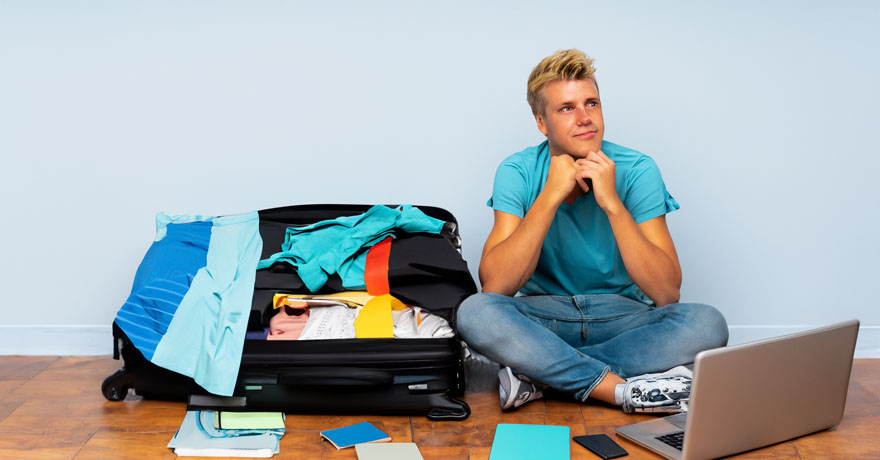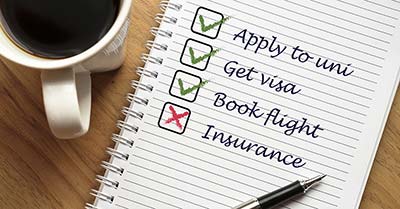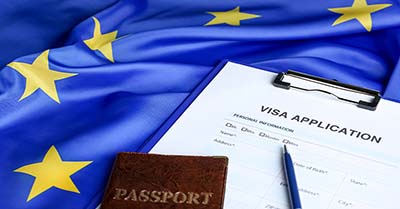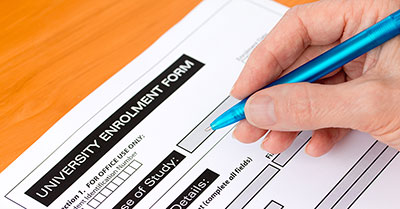Study abroad preparation
Have you been accepted to a school abroad and are waiting to start your adventure? Then it's time to prepare and make sure you don't forget anything important. Here is 10 tips:
If you haven't applied and been admitted to a school abroad yet, we recommend that you fill out our info request form to get started. Once you have been accepted to a school abroad, follow the checklist below:
1. Documentation and Visa
- Passport: Ensure your passport is valid for the entire duration of your study and preferably six months beyond. If you plan to study abroad for several years you might have to renew your passport while you study, but make sure that it is valid for at least your first year of study.
- Visa: Apply for a student visa or equivalent permit as soon as you receive your acceptance documents. Every country has its requirements, so closely follow the embassy or consulate's guidelines.
2. Accommodation
- Check if the university offers on-campus housing or assists in finding accommodation.
- If searching for housing independently, use reputable sources and be wary of potential scams.
We can currently help you with student housing in Japan, accommodation in Korea, and student accommodation in many other countries like the US, UK, Australia, Spain, Germany, France etc through our accommodation partner Uhomes.
Read more in our article Student Housing when studying abroad.
3. Finances
- Budget: Create an estimated budget for your stay, including tuition fees, housing, food, transportation, leisure activities, and other expenses.
- Money: Don’t travel with a lot of cash. Bring a credit card (Mastercard and Visa works almost anywhere) and don’t keep all your money and cards in the same place. If you want to study abroad for a long time or work while you study abroad we would recommend looking into opening a bank account in the host country. Otherwise we recommend using Wise for smooth international bank transfers, for example when paying your tuition fee.
4. Health and insurance
- Check required or recommended vaccinations for the country you want to study in.
- If you're on prescription medications, learn the rules for bringing them and how to get refills abroad. Get a letter from your doctor that explains why you need this medicine and what it does.
- Ensure that you have a good study abroad insurance covering healthcare and other contingencies. Your school usually wants to see proof of insurance, and you don’t want to be uninsured if something happens.
5. Culture and Language
- Educate yourself about the host country's culture, customs, and social norms to avoid cultural misunderstandings.
- If you don't already speak the language, consider enrolling in a basic language course or using language apps to learn essential phrases.
6. Packing
- Research the climate and pack appropriate clothing. Some items might be expensive or challenging to find abroad.
- Bring crucial documents, such as copies of your passport, visa, insurance, and university admission letter. We recommend that you upload all important documents (or photos of them) to Google Drive or a similar cloud service where you can access them at need.
Find more advice in our Packing list for studying abroad
7. Mental preparation and goal setting
Studying abroad can be challenging if you have not lived alone before and are used to having friends and family around you.
- Be prepared that studying abroad will never turn out exactly as you imagined before you left. It may take some time to find friends and get the hang of how everything works so take it easy and don’t panic the first week abroad!
- Think about what you want to achieve with your studies abroad and set goals for what you want to accomplish while you study abroad.
You can find more advice on this in our article How to maximize your Study Abroad experience
8. Academic Preparations
- Familiarize yourself with the university's system, which might differ from what you're accustomed to. This can range from registration processes to exam formats.
- Acquire necessary course materials and start to read a bit in advance. This will make you better prepared when your classes start.
9. Emergencies and communication
- Memorize essential emergency numbers in the host country. In the European Union the number is 112 and in the US it is 911.
- Research popular mobile carriers in the host country. Consider purchasing a local SIM card.
- Inform family and friends of your contact details and the best way to reach you while you're abroad. Also give them contact details to your school and accommodation.
10. Arrival
- Plan your arrival logistics, knowing how to get from the airport or train station to your accommodation.
- Check if the university offers an orientation or introduction day for international students.
Preparing for study abroad might seem overwhelming, but by taking it step by step and being thoroughly prepared, you can look forward to a rewarding and memorable experience. Best of luck with your studies!
More information
Find more information in our Study Abroad Checklist and our Study Abroad Handbook.
Follow @dreamstudiesabroad on Facebook, Instagram, Tiktok, or Youtube to get updated about our new schools and articles.






















